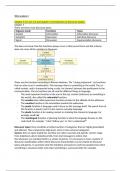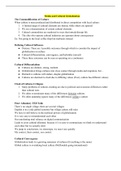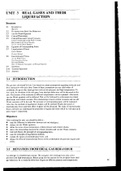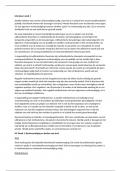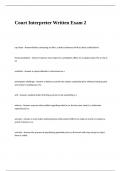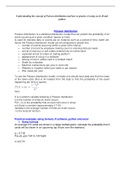Accounting for sustainable societies
Lecture 1
Origin of accounting theory
Accounting research/theory relies often on other disciplines, this is common in
accounting research because it is more a subfield (e.g. economics, psychology,
organizational behavior). Examples:
• Agency theory
• Institutional theory
• Behavioral accounting theory
• Contingency theory
• Upper echelons theory
• and many more ...
A simplistic theory example
Theory, hypothesis, and more
Theory: a formal set of ideas that is intended to explain why something happens or
exists. These can be abstract or concrete.
Hypothesis: an idea or explanation of something that is based on a few known facts but
has not yet been proven to be true or correct. Sometimes you do not find evident for your
hypothesis.
Proposition: similar to a hypothesis but the link cannot be verified by experiment. We
see this in qualitative research.
,Theorem: a rule or principle, especially in mathematics, that can be proven to be true.
Law: A generalized rule, especially in natural sciences, in the form of a mathematical
statement.
Basic levels of research
1. Description: collection and reporting data (observations) and basic statistics.
This is just a description of the data.
2. Classification: grouping (or clustering) of data based on similarities or
diOerences.
3. Explanation: make sense of the data by attempting to explain relationships (or
causality); generally concerned with the “Why?”. You not only observe, but also
explain it. Generally it is diOicult to explain the why.
4. Prediction: provide models that allow testable predictions for (future) events.
Causation is not the same as correlation!
Some more distinctions
Deductive (theory à observation) vs. Inductive
(observationà theory) reasoning.
Confirmatory vs. Exploratory research. By confirmatory
there has been done research earlier, but with exploratory it
has not. Exploratory: you don’t make it too hard to find
something.
,Lecture 2
The Kinney 3 paragraphs:
- What?
o What is the problem?
o What are you trying to find out?
- Why?
o Why is it an important problem?
o To whom?
- How? (the methodology)
o How will it be solved?
o How will it be done?
What: a research question
“A research question is a clear, focused, concise and arguable question around which
you center your empirical research project.”
Clear: minimize room for misinterpretation
Focused, concise: specific enough to be covered in a paper.
Arguable: it is not about personal opinions and you know the possible answers
(falsification is important).
Research questions are often (not always) motivated
both from theory and practice.
How: types of research
Not all research methods are
empirical
, Two broad categories of variables
- Collected variables: originating
from naturally-occurring or
human-managed data.
- Generated variables: data
created by us researchers
Two types of empirical settings in which we generate and collect variables
- Uncontrolled setting: setting has other potentially influential variables besides
the ones being studied.
- Controlled setting: setting restricts itself to the study of the variables of interest
and not others.
Lecture 1
Origin of accounting theory
Accounting research/theory relies often on other disciplines, this is common in
accounting research because it is more a subfield (e.g. economics, psychology,
organizational behavior). Examples:
• Agency theory
• Institutional theory
• Behavioral accounting theory
• Contingency theory
• Upper echelons theory
• and many more ...
A simplistic theory example
Theory, hypothesis, and more
Theory: a formal set of ideas that is intended to explain why something happens or
exists. These can be abstract or concrete.
Hypothesis: an idea or explanation of something that is based on a few known facts but
has not yet been proven to be true or correct. Sometimes you do not find evident for your
hypothesis.
Proposition: similar to a hypothesis but the link cannot be verified by experiment. We
see this in qualitative research.
,Theorem: a rule or principle, especially in mathematics, that can be proven to be true.
Law: A generalized rule, especially in natural sciences, in the form of a mathematical
statement.
Basic levels of research
1. Description: collection and reporting data (observations) and basic statistics.
This is just a description of the data.
2. Classification: grouping (or clustering) of data based on similarities or
diOerences.
3. Explanation: make sense of the data by attempting to explain relationships (or
causality); generally concerned with the “Why?”. You not only observe, but also
explain it. Generally it is diOicult to explain the why.
4. Prediction: provide models that allow testable predictions for (future) events.
Causation is not the same as correlation!
Some more distinctions
Deductive (theory à observation) vs. Inductive
(observationà theory) reasoning.
Confirmatory vs. Exploratory research. By confirmatory
there has been done research earlier, but with exploratory it
has not. Exploratory: you don’t make it too hard to find
something.
,Lecture 2
The Kinney 3 paragraphs:
- What?
o What is the problem?
o What are you trying to find out?
- Why?
o Why is it an important problem?
o To whom?
- How? (the methodology)
o How will it be solved?
o How will it be done?
What: a research question
“A research question is a clear, focused, concise and arguable question around which
you center your empirical research project.”
Clear: minimize room for misinterpretation
Focused, concise: specific enough to be covered in a paper.
Arguable: it is not about personal opinions and you know the possible answers
(falsification is important).
Research questions are often (not always) motivated
both from theory and practice.
How: types of research
Not all research methods are
empirical
, Two broad categories of variables
- Collected variables: originating
from naturally-occurring or
human-managed data.
- Generated variables: data
created by us researchers
Two types of empirical settings in which we generate and collect variables
- Uncontrolled setting: setting has other potentially influential variables besides
the ones being studied.
- Controlled setting: setting restricts itself to the study of the variables of interest
and not others.

